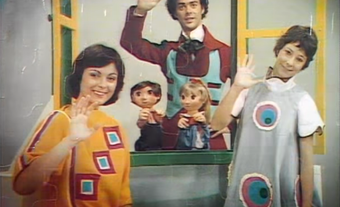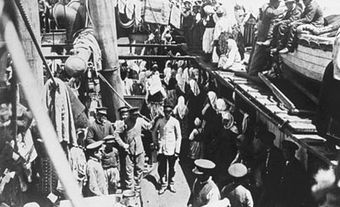Kim Yaroshevskaya (Ким Ярошевская), CM, stage, film and television actress, screenwriter, author and storyteller (born 1 October 1923 in Moscow, USSR). Kim Yaroshevskaya enriched the lives and stimulated the imaginations of several generations of children with her roles on French-language children’s television shows. She played the living doll Fanfreluche (Fafouin, La Boîte à Surprise and Fanfreluche) and the grandmother on the cult classic Passe-Partout.

Childhood
Kim Yaroshevskaya was born to highly idealistic, activist parents: an anarchist mother and a Trotskyist father. They named her Kim after the Russian acronym for the Young Communist International. (See also Communist Party of Canada.)
From Yaroshevskaya’s earliest childhood, her mother told her that she had to be strong, and though Yaroshevskaya asked for a doll for her birthday every year, her mother gave her toy weapons instead. But Yaroshevskaya couldn’t understand why her mother wanted her to be any different from her schoolmates. She made her own doll out of a kitchen spoon and a piece of cloth and turned it into a playmate, talking to it as if it were alive. Yaroshevskaya thus quickly realized that imagination could rescue people from harsh realities.
On Yaroshevskaya’s fifth birthday, her mother finally relented and gave her a doll, but sadly died shortly thereafter, and Yaroshevskaya was sent to an orphanage. Under Joseph Stalin’s dictatorship, her father was imprisoned, then sent to Voronezh. He died there under obscure circumstances (by drowning, according to some accounts). Yaroshevskaya was then seven, and this tragedy convinced her paternal grandmother to take Yaroshevskaya out of the orphanage to come live with her in Moscow.
Yaroshevskaya and her grandmother got along very well. An avid reader, Yaroshevskaya would retell the stories from her books to her grandmother, adding many fantastic and improbable touches of her own. But her grandmother never questioned them, respecting her granddaughter’s imagination. Thus Yaroshevskaya carried on the vocation of her father, who had been a writer and an excellent storyteller. In an interview years later, she said, “By working with stories, I learned that they are tools, and maybe the most important ones, to teach children how to survive… Witches and ogres represent the inner demons that children must learn to vanquish.”
Emigration to the West
In 1931, Kim Yaroshevskaya’s grandmother’s health began to decline. Suffering from cancer and concerned that she might not live long enough to secure her granddaughter’s future, she began trying to find her a new home. As a last resort, she considered sending Yaroshevskaya to live with her maternal grandparents in New York. But a series of political complications made it hard for Yaroshevskaya to leave the Soviet Union, and she was unable to secure a U.S. visa to join her grandparents in New York. Instead, Yaroshevskaya had to start making plans to head for Montreal to live with an aunt, one of her mother’s sisters whom she had never met. (See also Immigration to Canada.)
At age 10, Yaroshevskaya arrived in Quebec. She was allophone and enrolled in an anglophone school. After a rocky start, she learned English quickly and fit in well with the other children. Extracurricular activities helped her find her way at school. For the year-end holidays, she proposed putting on a play about the rituals and celebrations of Christmas, of which she had known nothing until then. She wrote the script for the play (in what she later described as sketchy English) and then directed it.
At age 15, Yaroshevskaya came down with tuberculosis. She had to leave school and spend two long years in a sanatorium. Despite this interruption, she continued learning throughout her life.
Actress
As a young woman, Kim Yaroshevskaya pursued her dream of becoming a dancer. She taught dance courses and helped out with a young theatre company called Le Grenier, observing their rehearsals and offering advice on the actors’ stage movements and body language. Over time, she became a friend of the troupe and felt increasingly at home with them. In addition to offering them movement workshops, she shared many notes and ideas for productions that they had under development. Guy Messier, one of Le Grenier’s co-founders, invited Yaroshevskaya to join the company as an actress and help them develop their first play for children. At first, she was reluctant to accept, because this play was aimed at children ages 4 to 12, and she still had trouble expressing herself in French. But when she suggested that the play’s characters be toys that had come to life, and that she play the role of Fanfreluche, a doll who danced but did not speak, her idea was accepted, and she joined the troupe at last. The year was 1953. One year later, Yaroshevskaya and Fanfreluche made their television debut on the airwaves of Radio-Canada. Fanfreluche, who looked like a ballerina out of the Bolshoi Ballet, learned to speak French along with her creator.
Yaroshevskaya first appeared as Fanfreluche on the children’s television series Fafouin, and then on another children’s TV show, La Boîte à Surprise. Fanfreluche became so popular that Radio-Canada then gave Yaroshevskaya a show devoted entirely to this character. This show, also named Fanfreluche, ran from 1968 to 1971, airing a total of 46 half-hour episodes, for which Yaroshevskaya wrote all the scripts. The series continued in reruns for many years. The character of Fanfreluche had a huge impact both on the actress and on the many children who watched her in the 1970s.
At that time, Radio-Québec (Quebec’s public educational television network) had a mandate to provide educational content for pre-school-age children and was in the process of developing Passe-Partout, a soon-to-be famous show for this age group. Radio-Québec, along with the show’s creators and the Quebec education ministry, offered Yaroshevskaya the role of the grandmother on the show. It began airing in 1977 and was an unprecedented hit. The grandmother was a logical extension of Fanfreluche. She listened to the three main characters talk about their emotions, offered them reassurance, and most importantly, always had a book close at hand to read them a story.
Yaroshevskaya was also very active in the theatre throughout her career. She appeared in some 50 plays and was equally at home in the plays of Chekhov, Ionesco, Pirandello and Quebec playwright Réjean Ducharme.
In the 1990s and 2000s, Yaroshevskaya also gained a wide audience as an author. In 1998, she published a book of short stories, La Petite Kim. In 2017, she published Mon voyage en Amérique, in which she frankly yet humorously told the story of her childhood and the circumstances that led her to flee the Soviet Union. She began a series of stage readings of this story that were so successful that they were sold out through 2020. Reviews for this show were excellent, with many critics mentioning that Yaroshevskaya had not lost her talent as a storyteller over the years. The show’s run had to be cancelled part-way into 2020 because of the COVID-19 pandemic.
Awards and Honours
Kim Yaroshevskaya was named a Member of the Order of Canada in 1991 and a Compagne de l’Ordre des arts et des lettres du Québec in 2017.

 Share on Facebook
Share on Facebook Share on X
Share on X Share by Email
Share by Email Share on Google Classroom
Share on Google Classroom


